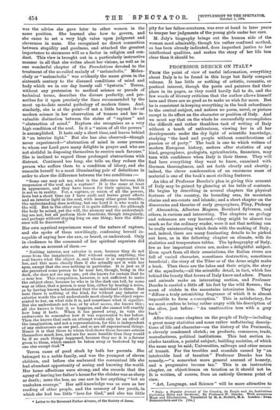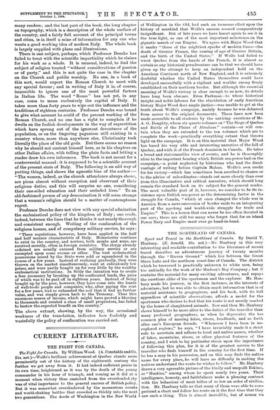PROFESSOR DEECKE ON ITALY.*
FROM the point of view of useful information,. everything about Italy is to be found in this large but fairly compact volume. It has little or nothing of artistic, romantic, or poetical interest, though the poets and painters find their place in its pages, as they could hardly fail to do, and the few words of literary criticism that the author allows himself here and there are so good as to make us wish for more. But he is consistent in keeping everything in the book subordinate to the central subject, and notices no poem, novel, or picture except in its effect on the character or position of Italy. And we must say that on the whole he successfully accomplishes the difficult and rather thankless task of writing of Italy without a touch of enthusiasm, viewing her in all her developments under the dry light of scientific knowledge, .
studying "the land and people without considerations of passion or of party." The book is one to which writers of modern European history, seekers after statistics of any kind, geographers, geologists, agriculturists, financiers, may turn with confidence when Italy is their theme. They will find here everything they want to know, examined with German thoroughness, and set forth clearly and shortly ; indeed, the clever condensation of an enormous mass of material is one of the book's most striking features.
An idea of Professor Deecke's plan in giving this account
of Italy may be gained by glancing at his table of contents. He begins by describing in several chapters the physical features of the country, its bounding seas, its mountain chains and sea-coasts and islands ; and a short chapter on the discoveries and theories of early geographers, Pliny, Ptolemy of Alexandria, Albertus Magnus, Bernhard Sylvanus, and others, is curious and interesting. The chapters on geology and volcanoes are very learned,—they might be almost too much so for the ordinary reader, were it not that nothing can be really uninteresting which deals with the making of Italy ; and, indeed, there are many fascinating details to be picked out here, as in the following chapter on climate, with its statistics and temperature tables. The hydrography of Italy, few as her important rivers are, makes a delightful subject. Even apart from all their associations, the Italian rivers are full of varied character, sometimes destructive, sometimes beneficial ; the story of the Tiber or of the Arno might make a book. Then there are the lakes and their origin, the story of the aqueducts,—all the scientific detail, in fact, which lies behind the beauty that lovers of Italy know and adore. Plants and animals make an interesting section, and Professor Deecke is carried a little off his feet by the wild flowers; the scent of violets in the mountains intoxicates him. They "diffuse a truly astonishing fragrance of which it is almost impossible to form a conception." This is satisfactory, for we must confess to being rather angry with his description of the olive, just before : "An unattractive tree with a grey bark."
After this come chapters on the people of Italy—including a great many statistics and some rather unflattering descrip- tions of life and character—on the history of the Peninsula, a cleverly condensed sketch; on products, commerce, trade, manufactures, political institutions. This last section in- cludes taxation, a painful subject; building societies, of which the same may be said; Universities, railways and other means of transit. For the troubles and scandals caused by "an intolerable load of taxation" Professor Deecke has his remedy,—" a somewhat more general amount of honesty, and a progressive income tax." This is an instructive chapter, an object-lesson on taxation as it should not be. It is written, of course, from an entirely German point of view.
"Art, Language, and Science" will be more attractive to
* a Popular Account of the Country, its People and its Institutions
(including Matta and Sardinia). By Professor W. Douche. With numerous Maps and Illustrations. Translated by H. A. Nesbitt, M.A. London Swan Sonnenschein and Co. [158.]
many readers; and the last part of the book, the long chapter on topography, which is a description of the whole surface of the country, and a fairly full account of the principal towns • and cities, is in itself a mine of information for any one who wants a good working idea of modern Italy. The whole book is largely supplied with plans and illustrations.
There is one subject, perhaps, which Professor Deecke has failed to treat with the scientific impartiality which he claims
for his work as a whole. It is unusual, indeed, to find the subject of religion treated "without considerations of passion or of party," and this is no't quite the case in the chapter on the Church and publics worship. No one, in a book of
this sort, would expect the Roman Church to meet with any special favour ; and in writing of Italy it is, of course, impossible to ignore one of the most powerful factors in Italian life. The word "Rome" has not yet, in any case, come to mean exclusively the capital of Italy. It takes more than forty years to wipe out the influence and the traditions of eighteen centuries. Professor Deecke was bound to give what account he could of the present working of the Roman Church, and no one has a right to complain if he dwells on the foolish developments in the way of superstition • which have sprung out of the ignorant devoutness of the population, or on the lingering paganism still existing in a country where, more than anywhere else, Christianity took literally the place of the old gods. But there seems no reason why he should not content himself here, as in his chapters on other Italian affairs, with telling the plain facts and letting a ,reader draw his own inferences. The book is not meant for a controversial manual; it is supposed to be a scientific account of the present state of Italy. The following is an odd way of putting things, and shows the agnostic bias of the author :— " The women, indeed, as the church attendance always showr, are pious almost without exception and observant of their religious duties, and this will surprise no one, considering their one-sided education and their secluded lives." To an old-fashioned person of any denomination it will seem strange that a woman's religion should be a matter of contemptuous Professor Deecke does not view with any special admiration the ecclesiastical policy of the kingdom of Italy ; one reads, indeed, between the lines that he thinks it not nearly thorough and consistent enough. Writing of the confiscation of the *religious houses, and of compulsory military service, he says :
"These regulations, however, have been applied in the half and half manner characteristic of Italy. Monasteries continue to exist in the country, and novices, both monks and nuns, are received secretly, often in foreign countries. The clergy already ordained are usually excused from military service or are exempted upon some excuse or other. The vast ecclesiastical possessions seized by the State were sold or squandered in the course of a few years. Instead of realising gradually, they were thrown on the market simultaneously, went at ridiculously low prices, and were partly bought up for very little by the wealthy ecclesiastical institutions. In Sicily the intention was to create a free yeomanry by breaking up the confiscated lands, the price of which was to be paid off in eighteen years. Instead of being bought up by the poor, however, they have come into the bands of well-to-do people and companies, who, after paying the rent for a few years, had so exhausted the soil that it had no further value, and was simply given back to the Treasury. Thus this enormous source of income, which might have proved a blessing to thousands and created a class of small proprietors, has failed to bestow the expected benefit on the country.'
The above extract, showing, by the way, the occasional weakness of the translation, indicates how foolishly and wastefully the policy of confiscation was carried out.























































 Previous page
Previous page